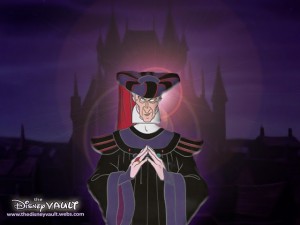Pay your taxes, do not drive above the speed limit, do not steal things, do not park in handicap parking spots, do not commit indecent exposure in public…etc. Laws such as these and many others regulate our lives. In some instances they benefit the general public, such as laws that state murder and arson. Yet other laws regulate less malicious activities but can officially inflict harsh punishments, such as potentially receiving five years in prison for breaking a window or other property damage. This is not a new quandary; in fact Shakespeare encapsulates and explains this conundrum in Measure for Measure.
The character Angelo represents strict rule of law in this play. In the beginning of the play he follows the letter of the law when passing judgment on offenders, and does not grant leniency. He is so dedicated to following the rule of law in the beginning of the play that he states “When I that censure him do so offend, / Let mine own judgment pattern out my death/ And nothing come in partial.” (II.1. 29-31). Here he proclaims that no matter who breaks a law even if it is  himself and no matter the gravity of the law broken, the full punishment prescribed in the legislation must be enacted. In this early stage of the play Shakespeare sets up a common conception that such adherence to the law is a good thing. He does so by having Angelo represent this form of strict adherence to the law. The name Angelo can mean angel, or
himself and no matter the gravity of the law broken, the full punishment prescribed in the legislation must be enacted. In this early stage of the play Shakespeare sets up a common conception that such adherence to the law is a good thing. He does so by having Angelo represent this form of strict adherence to the law. The name Angelo can mean angel, or
messenger of God. The connotations of this name are positive and thus the depiction of the character Angelo upholding the letter of the law is also seen as being positive. Furthermore, the meaning of Angelo as a messenger of God implies that in this play laws are decrees from God Himself, and thus are both just and should be strictly followed.
However, as the play progresses this image of rigorous governance evolves with the character of Angelo. All characters in the play believe that Angelo’s sentencing of Claudio to death is although lawful, too harsh a punishment for impregnating a women he intended to eventually marry. Yet, while governing in the Duke’s absence Angelo refuses to spare Claudio stating “We must not make a scarecrow of the law” (II.1.1). Despite his seeming purity in the beginning of the play, Angelo offers Claudio’s sister Isabella a deal “either/ You must lay down the treasures of your body/ To this supposed, or else let him suffer,” (II.4.94-96). Here Angelo falls from grace by saying that if Isabella sleeps with him he will pardon her brother. From this point on in the play Angelo is perceived as being villainess, and thus by extension law and governance can also be perceived as villainess. This is not only because Shakespeare makes Angelo a  representational figure for law, but also because he attempts to use the law and its authority to make himself immune to rebuke for his crimes. This can be seen in his statement “How might she tongue me! But that her tender shame/ For my authority bears off a credent bulk/ That no particular scandal once can touch” (IV.5.23-25). This shows how law can be abused to enact injustice. Not only does Angelo’s power of governance and enacting laws grant him the ability to execute Claudio for a moderate crime, but it also gives him some protection from deserved punishments.
representational figure for law, but also because he attempts to use the law and its authority to make himself immune to rebuke for his crimes. This can be seen in his statement “How might she tongue me! But that her tender shame/ For my authority bears off a credent bulk/ That no particular scandal once can touch” (IV.5.23-25). This shows how law can be abused to enact injustice. Not only does Angelo’s power of governance and enacting laws grant him the ability to execute Claudio for a moderate crime, but it also gives him some protection from deserved punishments.
This evolution of Angelo throughout Measure for Measure brings up a biblical reference as well. Since the name Angelo can mean angel and the character Angelo goes from being a well-respected man and favorite of the Duke in the play to a vile and deceitful character; a parallel can be drawn between Angelo and the fallen angel Lucifer. Both Angelo and Lucifer follow laws rigorously, which often results in unpleasant consequences for an involved party. Angelo does so by insisting on the execution of Claudio. While the Devil, Lucifer, does so by making and then strictly enforcing contracts. Thus, Angelo encapsulates the quandary of law. Law provides structure for society which makes it well regarded like Angelo is at the beginning of the play. However, if observed too rigorously than it becomes tyrannical, just as Angelo does as the play progresses.

